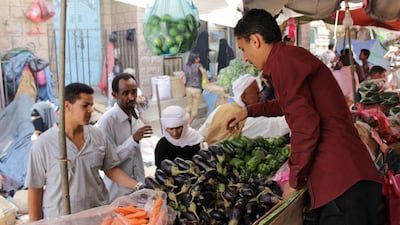SANAA // A new wave of optimism was seen in Sanaa on Wednesday as aid agencies began delivering help to desperate Yemenis across the country.
It came after a five-day ceasefire took effect at midnight on Tuesday, bringing to a pause nearly seven weeks of fighting between Houthi rebels and forces loyal to the exiled government, backed by Saudi-led air strikes.
In central Sanaa, around 150 people gathered in the Al Mafrj wedding hall for the marriage of 32-year-old Tarek Al Zarqah and his new wife, Najwa Al Baghdadi.
After weeks filled with grief and fear, the wedding was a happy occasion for those attending - made even happier by the absence of gunfire and explosions.
"I am here to celebrate with my dear friend this memorable occasion, and we hope the ceasefire lasts to be able to buy goods and basic needs and to get ready for the next stage of the war," said Abdulsalam Al Ansi, a civil engineer and friend of Mr Al Zarqah.
The groom, meanwhile, said he was grateful that his wedding could take place in relative peace.
Despite the smiles, however, the wedding was a sombre affair by pre-war Yemeni standards. Weeks of fighting has led to power and fuel shortages across the country, and many of Mr Al Zarqah's friends and relatives from other parts of the country were unable to attend.
Elsewhere in Sanaa, the previously ghostly streets were crowded for the first time in more than a month. People were laughing and speaking animatedly.
Ghumdan Al Sabahi, a telecommunication engineering student, said the halt in fighting had given residents freedom - albeit temporary.
"Personally, my house was terribly damaged by the air strikes and I was stuck in home," he said. "Today I finally could go to see doctors and get some treatment."
A tour operator in Sanaa's Old City said: "I think today is a holy day, Allah is with us."
This optimism had begun to fade slightly by Wednesday evening, however, when the sounds of explosions and gunfire returned to the city.
The ceasefire was also showing signs of faltering in other parts of the country. Just hours after the truce took effect, a Saudi defence ministry official said rockets were fired from Houthi rebel's stronghold in the north, hitting the border areas of Jazan and Najran inside the kingdom.
However, the official said Saudi forces had "practised self-restraint as part of their commitment to the humanitarian truce" and that there had been no casualties.
The attack came despite a promise by the Iran-backed Houthi rebels and their allies, supporters of the former president Ali Abdullah Saleh, to abide by the ceasefire. Riyadh has warned it will punish any attempt to exploit the truce.
More than 1,500 people have been killed since mid-March in the air campaign and fighting between rebel forces and supporters of exiled president Abdrabu Mansur Hadi, according to the United Nations.
The Houthis have taken control of large parts of Yemen including Sanaa and were advancing on Mr Hadi's southern stronghold of Aden when Riyadh launched the air campaign on March 26.
The weeks since the start of the air war have seen repeated warnings of a dire humanitarian crisis, with shortages of food, water, fuel and medical aid.
UN agencies and private aid groups had been preparing to boost their efforts since the ceasefire was announced last week and on Wednesday began taking steps.
A ship chartered by the United Nations World Food Programme (WFP), which arrived in Yemen last week, began distributing much-needed fuel to areas across the country, an industry official in the port city of Hodeidah said.
News of the deliveries prompted motorists to start queuing at petrol stations in Sanaa, residents said.
The head of Doctors Without Borders (MSF) in Yemen, Marie-Elisabeth Ingres, said her group was also hoping to "take advantage of the truce that seems to be holding".
A plane carrying medical aid and MSF personnel was expected to arrive in Yemen later on Wednesday, she said, with a second aircraft set to follow on Thursday.
But the five-day truce is "not sufficient given the needs of the population", Ms Ingres said, insisting on the need for "permanent access" to all regions affected by the conflict.
* Additional reporting from Agence France-Presse

Sanaa wedding symbolises hope in Yemen on first day of ceasefire
After nearly seven weeks of fighting in the country, Tarek Al Zarqah was able to celebrate his marriage to Najwa Al Baghdadi without the sounds of explosions and gunfire overhead, Mohammed Al Qalisi reports.
Most popular today
